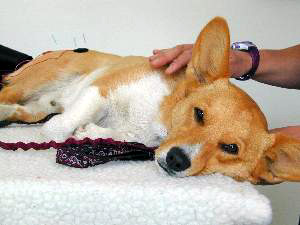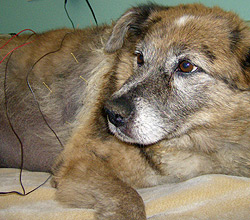|
Acupuncture
treats a lot
more than painful conditions!
It is true that acupuncture can have some lasting effects on improving
quality of life in deep bone pain cases. However, it works best
when implemented sooner in the disease process and it works best
in cases that are reversible.
Acupuncture
has promise for helping any pet that has a reversible or painful
condition.
Pain: muscular tension, neck and back pain, neuropathic
pain, soft
tissue pain, bony pain, cancer pain
Gastrointestinal
diseases: chronic diarrhea, constipation, vomiting
Skin
problems: skin lesions, skin allergies and acral lick granulomas!
Eye
problems: best for keratoconjunctivitis sicca but also may
help in uveitis, corneal ulcers and cataracts
Neurologic
disease: especially epilepsy and seizure cases
Respiratory
tract: laryngeal paralysis, seasonal allergic rhinitis,
asthma, and possibly reverse sneezes
Urinary
issues: incontinence, recurring urinary tract infections
Immune
system: immune function boosts & autoimmune conditions
Exotic species: especially feather picking birds and anorexic
reptiles
|
|
 Acupuncture,
a component of Traditional Chinese Medicine or TCM, can be used
as part or an integrative approach to many medical problems. In
TCM the patient is seen as a whole organism with interconnected
energy. In Western Medicine views the animal in terms of its specific
body systems. Both TCM and Western Medicine have benefits. Integrative
medicine is a combination of TCM and Western Medicine. Acupuncture,
a component of Traditional Chinese Medicine or TCM, can be used
as part or an integrative approach to many medical problems. In
TCM the patient is seen as a whole organism with interconnected
energy. In Western Medicine views the animal in terms of its specific
body systems. Both TCM and Western Medicine have benefits. Integrative
medicine is a combination of TCM and Western Medicine.
At Pet Kare Clinic, we can use acupuncture and herbal medicines
to help the body correct imbalances in the flow of Qi (pronounced
"chi") or vital energy. Qi moves in the body by meridians
that are connected to internal organs. Acupuncture points can
be palpated to determine imbalances or Blockages of this energy
in the patient. By inserting needles into these acupuncture points,
the Qi can be accessed. Acupuncture points can also be stimulated
by heat (moxa), mild electrical stimulation (ES) or by injecting
a tiny amount of Vitamin B12 liquid.
Recently
there has been much peer-reviewed scientific research on the efficacy
of acupuncture. Many neuro-physiologic pathways have been explored
and shown to have benefit when stimulated with needles, heat,
or electric stimulation. Qi can be thought of by the western perspective
as flow. Flow of nerve impulses and flow of blood. We are trained
in "neuroanotomic acupuncture", which has less emphasis
on the "energy" and more emphasis on the nervous system
using an evidence based approach.
If
how acupuncture works interests you, or if you're seeking additional
information regarding the scientific basis for acupuncture, please
consult the following Western Veterinary Conference proceedings
by Narda G. Robinson, DO, DVM, DABMA, FAAMA:
If
you'd like to discuss how acupuncture works on a neuro-physiologic
level, please talk to Dr. Paige.
When Can Acupuncture Be Used?
Acupuncture is often used for chronic conditions when conventional
medicine hasn't worked or is unsafe. See the list to the left
to see if your pet's condition might be helped!
Acupuncture
treatments can also be used in combination with other procedures.
 What
To Expect During A Treatment What
To Expect During A Treatment
Acupuncture
treatments are generally soothing. During a session, needles are
inserted into specific places (acupuncture points) and are left
in for 10 - 20 minutes. Most animals don't have any outward reactions
to this and many get very sleepy or relaxed.
Some
animals benefit from "Aquapuncture," or the injection
of a liquid - often vitamin B-12 - right at the acupuncture point.
It
may take multiple treatments to see the effects of acupuncture,
and anyone interested in testing it's efficacy should commit to
at least 3 - 4 sessions. Since treatments are often calming, it
is normal for most patients to be sleepy for several hours after
a session of acupuncture. Studies show that acupuncture works
well in about 75% of patients.
We are proud to have a certified veterinary
acupuncturist on staff. Dr. Paige is available for you to evaluate if acupuncture is the right treatment for
your pet.
|